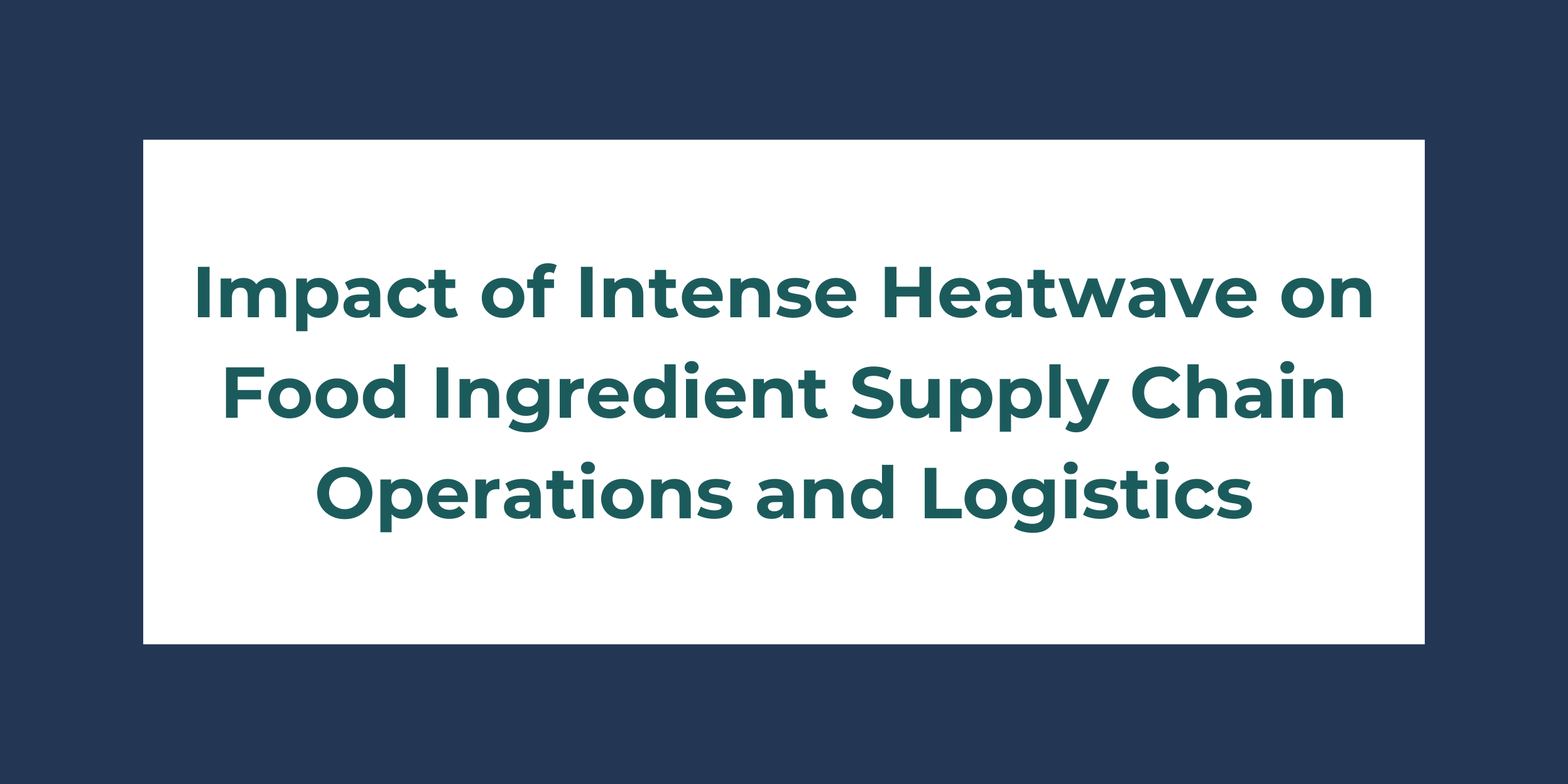Intense heatwaves, like the one India is going through right now, have a severe impact on all walks of life and business.
In the food ingredient market, intense heat waves significantly impact the Supply Chain operations and Logistics, due to the heat sensitive and perishable nature of these products.
This blog explores these challenges in detail and provides strategies for businesses to navigate and mitigate the impacts.
1. Transportation Infrastructure and Delays due to Heatwave
Heatwaves can severely affect India’s transportation infrastructure.
High temperatures cause road surfaces to soften and degrade, rail tracks to expand, and increase the likelihood of vehicle breakdowns.
This leads to delays and disruptions in the movement of food ingredients from farms to processing units and markets.
Mitigation Strategies:
- Scheduling Adjustments:
- Shifting transportation schedules to cooler parts of the day can reduce the risk of heat-related damage and delays.
- Enhanced Maintenance:
- Regular maintenance and monitoring of vehicles and infrastructure can help preempt and address issues caused by extreme heat.
2. Cold Chain Logistics and Spoilage
Perishable food ingredients, such as fruits, vegetables, and dairy products, are highly vulnerable to spoilage during heatwaves.
The efficacy of cold chain logistics is critical, but high temperatures can overburden refrigeration systems, leading to failures and increased spoilage rates.
Mitigation Strategies:
- Robust Cold Chain Infrastructure:
- Investing in advanced refrigeration technologies and ensuring that cold storage facilities are well-maintained can mitigate the risk of spoilage.
- Backup Power Systems:
- Ensuring that cold storage units and refrigerated vehicles have reliable backup power sources can prevent spoilage during power outages.
- Real-Time Monitoring:
- Implementing lot-based temperature monitoring systems in cold storage and transport units can help in maintaining optimal conditions and taking immediate corrective actions if necessary.
3. Increased Transportation Costs
Heatwaves lead to increased fuel consumption due to the need for additional cooling in vehicles and slower transportation speeds to avoid overheating.
This results in higher operational costs, which can impact the overall profitability of the supply chain.
Mitigation Strategies:
- Fuel-Efficient Technologies:
- Adopting fuel-efficient and hybrid vehicles can help reduce fuel consumption and costs.
- Optimized Routing:
- Using logistics management software to plan the most efficient routes can minimize travel time and fuel usage.
- Bulk Transport:
- Consolidating shipments to maximize vehicle capacity can reduce the number of trips required, thus saving on fuel and reducing costs.
4. Warehouse Operations and Worker Safety
Warehouses, especially those without climate control, can become extremely hot during heatwaves, posing health risks to workers and affecting the quality of stored ingredients.
High temperatures can accelerate the degradation of sensitive ingredients and create unsafe working conditions.
Mitigation Strategies:
- Climate-Controlled Warehousing:
- Investing in air conditioning or ventilation systems for warehouses can help maintain a stable temperature for stored goods and provide a safer working environment.
- Worker Safety Protocols:
- Implementing safety protocols, such as providing adequate hydration, rest breaks, and protective gear for workers, can mitigate health risks.
- Automated Systems:
- Utilizing automated storage and retrieval systems can reduce the need for human labor in extremely hot conditions, improving both efficiency and safety.
5. Supply Chain Disruptions and Contingency Planning
Heatwaves can cause significant disruptions across the supply chain, from production delays to transportation bottlenecks.
The unpredictability of extreme weather events necessitates robust contingency planning to maintain supply chain resilience.
Mitigation Strategies:
- Diversified Sourcing:
- Diversifying the sourcing of ingredients from different geographical regions can reduce dependency on any single area and mitigate the risk of local disruptions.
- Stockpiling and Inventory Management:
- Building strategic reserves of critical ingredients can help buffer against supply shortages during heatwaves.
- Emergency Response Plans:
- Developing and regularly updating emergency response plans, including alternative transportation routes and backup suppliers, can ensure quick and effective responses to disruptions.
Conclusion
Intense heat waves present significant challenges to supply chain operations and logistics in India’s food ingredient sector.
However, by investing in infrastructure, enhancing cold chain logistics, optimizing transportation, ensuring worker safety, and implementing robust contingency plans, businesses can mitigate these risks.
Proactive measures and strategic planning are essential for maintaining the resilience and efficiency of the supply chain, ensuring the continuous availability and quality of food ingredients in the face of rising temperatures.
As we move towards irreversible climate damage that continues to impact global weather patterns, these strategies will be crucial for securing the future of India’s food ingredient supply chain.








